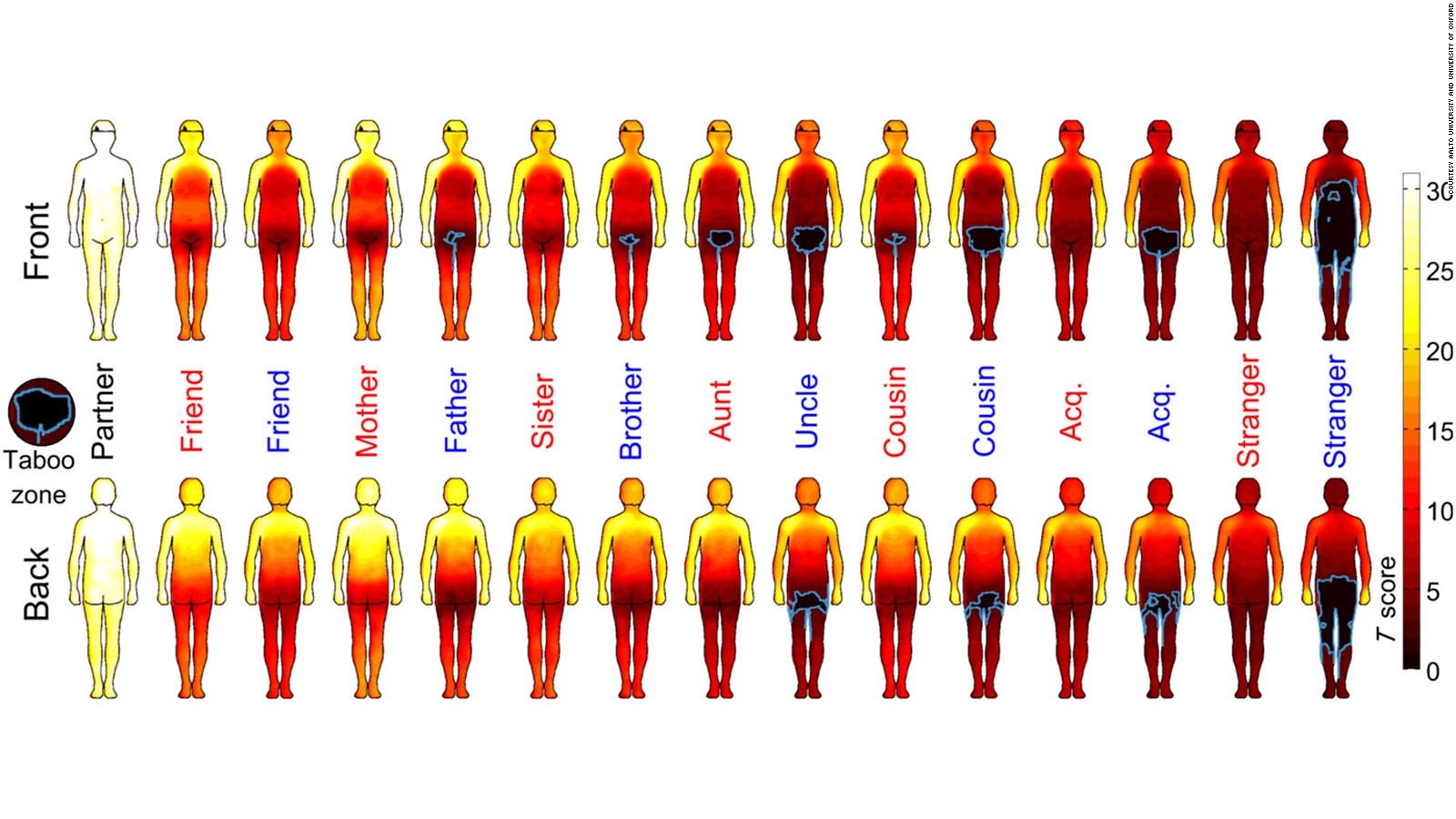Where we like being touched, where we don't and why

The blue-outlined black areas highlight taboo zones, where a person with that relationship is not allowed to touch. Blue and red labels signify male and female subjects, respectively.
Story highlights
- Researchers determined where, and by whom, people are most comfortable being touched
- Still, an expert said, "One's response to touching is totally context-dependent"
(CNN)After a series of experiments to determine where, and by whom, people are most comfortable being touched, researchers made some surprising, and some intuitively obvious, findings, recently published in the medical journal PNAS.
Perhaps not so surprising, women are more at ease with being touched than men. And men are more comfortable being touched by a woman than by another man.
But then, men feel more comfortable being touched by strangers than by women. And women were allowed to touch more areas of the body than men.
Researchers at Aalto University in Finland and the University of Oxford in the United Kingdom showed 1,368 participants front and back silhouettes of human bodies, with words designating members of their social network, such as family, friends, acquaintances and strangers. They were asked to color in the bodily regions where each individual in their social network would be allowed to touch them.
Hot spots
"The partner was allowed to touch basically anywhere over the body, closest acquaintances and relatives over the head and upper torso, whereas strangers were restricted to touch only the hands," the authors wrote.
"Taboo zones, where touching was not allowed, included the genitals for extended family and males in family, acquaintances and strangers, as well as the buttocks for males in extended family, acquaintances and strangers."
Interestingly, frequency of social contact with an individual did not predict the areas designated for preferred or acceptable touching. The greater the emotional bond, however, the larger the bodily area open for touching.
But it's more complicated than that, some experts say.
"One's response to touching is totally context-dependent," said David J. Linden, a neurobiologist and author of "Touch: The Science of Hand, Heart and Mind." "If you do it in a laboratory or you ask people to imagine, it's really hard to get a useful answer."
"Imagine a caress on your arm from your sweetheart when you're feeling connected and loving. Now imagine the exact same caress, yet it feels completely different if ... it's in the middle of an argument that's unresolved. It will feel different from the very first moments of perception, because areas of the brain responsible for touching also compute things like context: 'Am I under threat?' 'What's my emotional state?' 'How much attention am I paying to this?' "
That is to say, if researchers were to ask the same participants in the study to take the test again -- while in a different frame of mind -- the results would be totally different.
Another important caveat to note is the limit on the data set. Participants were selected from five European countries: Finland, France, Italy, Russia and the United Kingdom.
"They confined their analysis to countries and cultures where a certain degree of social touching is allowed," said Linden. "If you did the study with Orthodox Jews or devout Muslims or other groups out in the world, it wouldn't work at all."
Pursuit of pleasure
"Acceptability of social touch was most limited (i.e., most relationship-specific) in regions with the strongest hedonic sensitivity," the authors wrote. In other words, our most sensitive spots are, well, our most sensitive spots.
"Different parts of the skin convey different kinds of touch," said Linden. "In the brain, there is a different biological basis for these maps. In general, we're averse to being touched sexually by strangers -- and women are more averse than men. Your (sexual organs) feel vulnerable and you want to protect them."
Linden said there are different kinds of nerve endings that convey different kinds of information -- but we don't yet know the whole story.
"We know that a touch on the genitals feels different than a touch just about anywhere else on the body," said Linden. "If we took the skin of the genitals and looked at it under a microscope, we would see something different that accounts for that: mucocutaneous end organs, that look like coiled, naked nerve endings."
This may be one reason we're more comfortable being touched on our backs as opposed to, say, on our lips.
If you were to be poked with two pencil points on the small of your back, you likely wouldn't be able to tell if it was in fact one point or two. If you were poked with two pencil points on your lip, though, you'd know for sure and feel it much more distinctly.
Stranger danger
Men and women also have different relationships with sexual violence.
"From an evolutionary standpoint, it makes sense that women are wary of being touched by strangers," said Wendy Walsh, a relationship expert, author and radio host. "Women have evolved mechanisms to be choosy about whom they mate with and to fear rape by a stranger. However, touch by friends is both relational -- women tend to befriend as a buffer against stress -- and pleasurable. Touch gives a nice boost of dopamine, the 'feel-good' hormone."
"Men, on the other hand, tend to be less choosy with whom they mate," Walsh said. "So it stands to reason that touch by a stranger increases the chances for a sexual opportunity."